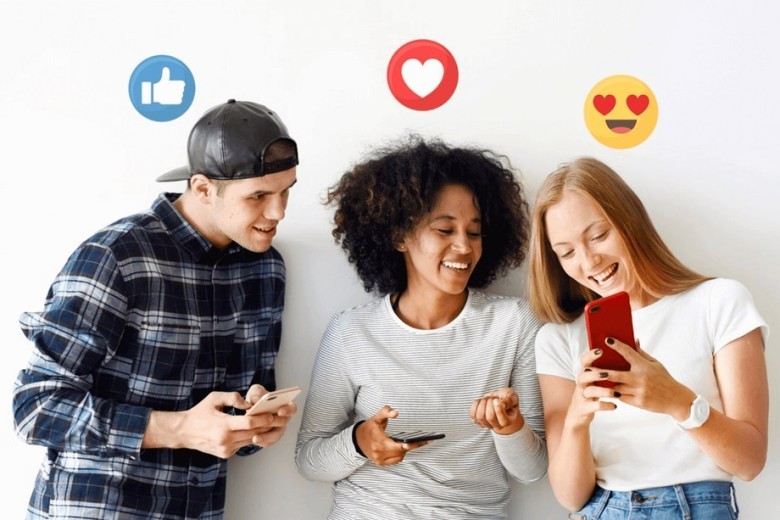
Social Media Use Linked to Body Image Issues in Young Adults
A new study from researchers at the University of Pennsylvania has found a concerning correlation between social media usage and body image disturbances in young adults. The study, published in the Journal of the American Medical Association, suggests that increased time spent on image-focused social media platforms is associated with higher rates of body dissatisfaction and eating disorder symptoms.

The research team, led by Dr. Melissa Sattler, surveyed over 1,500 college students between the ages of 18 and 25 about their social media habits and mental health. Participants were asked to report the average number of hours per day spent on various social media platforms, as well as complete standardized assessments measuring body image, self-esteem, and eating disorder symptomatology.
"What we found was a clear link between higher social media usage, particularly on platforms like Instagram and TikTok, and poorer body image and disordered eating behaviors in our study population," explained Sattler. "The more time young adults were spending scrolling through idealized images of bodies and lifestyles, the more likely they were to experience dissatisfaction with their own appearance and turn to unhealthy coping mechanisms."
Drilling down into the data, the researchers discovered that individuals who spent more than 2 hours per day on social media had significantly higher rates of body dissatisfaction compared to their peers who used social media for less than 30 minutes daily. Furthermore, those in the high-usage group were nearly twice as likely to report clinically relevant symptoms of eating disorders such as restrictive eating, binge-purge behaviors, and excessive exercise.
"The findings underscore just how powerful and pervasive the impact of social media can be, especially for young and impressionable populations," said Dr. Sattler. "These image-driven platforms seem to be fueling an epidemic of body image issues and disordered eating that we can no longer ignore."
The Role of Idealized Imagery and Social Comparison
Experts believe the strong link between social media use and body image disturbances stems from a complex interplay of psychological and sociocultural factors. At the core of the issue is the proliferation of highly curated, idealized imagery that dominates many popular social media platforms.
"We're bombarded with flawless, heavily edited depictions of bodies that simply don't reflect reality," explained Dr. Emma Greenberg, a clinical psychologist who specializes in eating disorders. "This cultivates a skewed sense of what constitutes a 'normal' or 'attractive' physique, leading users - especially young women - to feel inadequate by comparison."
The study found that participants who reported greater engagement with appearance-focused content, such as following fitness influencers or "thinspiration" accounts, were at an even higher risk for body dissatisfaction and disordered eating.
"Social media has turbo-charged the age-old phenomenon of social comparison," said Dr. Greenberg. "With the constant exposure to these idealized images, it's all too easy for young people to start internalizing unrealistic beauty standards and become overly critical of their own bodies."
Compounding this issue is the tendency for social media to foster a competitive, performative culture centered around physical appearance. Users may feel pressure to present a curated, "Instagram-worthy" version of themselves, further fueling anxiety about body image.
"There's this constant need to 'keep up' and portray this perfect, aspirational lifestyle," said Sattler. "And when users inevitably fall short of these impossible standards, it can lead to a downward spiral of self-criticism and disordered behaviors."
Implications and the Need for Digital Wellness Education
The findings from the University of Pennsylvania study align with a growing body of research demonstrating the detrimental impact of social media on mental health, particularly among adolescents and young adults. Experts warn that the ramifications of this trend could be severe, both in the short and long term.
"Body image issues and eating disorders can have profoundly negative effects on physical health, cognitive function, and overall well-being," said Dr. Greenberg. "If left unchecked, these problems can persist well into adulthood and become increasingly difficult to treat."
Beyond the individual toll, the researchers emphasize that the social media-driven body image crisis also carries broader societal implications.
"When a significant portion of young people are struggling with body dissatisfaction and disordered eating, it can have far-reaching consequences for public health, healthcare costs, and overall quality of life," explained Sattler. "We need to start taking this issue much more seriously."
To address these concerns, the study's authors are calling for a renewed focus on digital wellness education, both at the individual and institutional level.
"Parents, educators, and policymakers need to be proactive in equipping young people with the tools to navigate social media in a healthy, balanced way," said Sattler. "This means teaching critical media literacy skills, fostering body positivity, and promoting an understanding of the artificial nature of much online content."
Some potential intervention strategies proposed by the researchers include:
Incorporating social media literacy and digital wellness curriculum into school health programs
Encouraging social media platforms to implement stricter policies around truth in advertising and the editing of images
Empowering influencers and content creators to promote more authentic, diverse representations of the human body
Expanding access to mental health resources and eating disorder treatment for young adults
"We have to start acknowledging social media as a public health issue, not just an individual one," said Dr. Greenberg. "Only then can we begin to mitigate the widespread damage being done to the self-esteem and body image of our young people."
As the ubiquity of social media continues to grow, the researchers warn that the crisis of body image disturbances is likely to worsen unless concerted action is taken. The stakes, they say, have never been higher.
"We're dealing with a generation that has essentially grown up with social media as the backdrop to their formative years," said Sattler. "The long-term implications of this are still largely unknown, but the trends we're seeing are deeply troubling. It's time to take this problem seriously and implement meaningful solutions."












Comments
0 comment